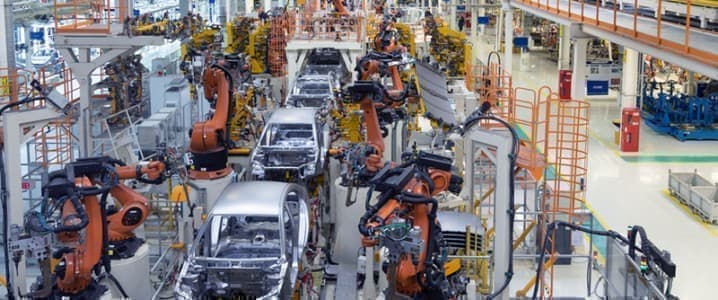Amid a global shortage of semiconductors, the U.S. auto manufacturing industry is scaling back production this month, including that of the top-selling U.S. vehicle.
China’s soaring imports of semiconductors, the rise in the electronics industries, and the jump in technology use during the pandemic, combined to create a perfect storm on the global semiconductor market, whose supply chain is strongly interconnected.
Detroit’s Big Three announced this month that they would be reducing production at some factories in the United States, Canada, and Mexico, as the severe shortage of supply of semiconductors and microchips is affecting the global automotive supply chain.
The growing importance of technology in new vehicles—with more computer technology and infotainment—has started to feel in recent months the increased significance of semiconductors.
“Semiconductors are the new oil,” Rory Green, Economist - China, the Koreas, and Taiwan at investment research firm TSLombard, said in a note last week.
According to estimates from TS Lombard and CEIC, the value of China’s imports of semiconductors exceeded the value of its oil imports five years ago and has been rising since.
“The rapid acceleration of the ‘internet of things’, to-date and to-come, forever moves semiconductors ahead of oil as the world’s key commodity input for growth,” TS Lombard said, noting that the current chip supply crunch is indicative of the scale and speed of that change.
Like OPEC was for oil production, Taiwan and South Korea are now “near-monopoly producers” of semiconductors, according to TS Lombard’s analysts.
Related Video: The Silver Squeeze Conspiracy
Combined, Taiwan and South Korea account for a massive 83 percent of global processor chip output and for 70 percent of memory chip production.
The United States is the leader in terms of developing and selling semiconductors, but chip manufacturing has shifted to Asia, “enough so for the US trade position to turn negative,” TS Lombard says.
The U.S. Semiconductor Industry Association also acknowledges that the U.S. continues to lead in design and research and development, but the lion’s share of chip manufacturing is now occurring in Asia.
Policymakers now must appropriate funding for federal incentives for U.S. chip manufacturing and investments in research in order to “reinforce American leadership in semiconductors, strengthen the U.S. economy and job creation, and make semiconductor supply chains more resilient to future crises,” Falan Yinug, Director, Industry Statistics and Economic Policy at the association, wrote last week.
The current shortage is cutting into the production of U.S. vehicles. GM confirmed last week its assembly plants in Fairfax (Kansas), CAMI (Ontario), and San Luis Potosi (Mexico) would take downtime on all shifts this week.
“Despite our mitigation efforts, the semiconductor shortage will impact GM production in 2021,” the automaker said.
The Windsor Assembly plant of Stellantis in Canada, which makes Chrysler Pacifica, Chrysler Voyager, and Dodge Grand Caravan minivans, will be down for 3 weeks starting on February 8, due to the semiconductor shortage, Local 444 Unifor union said last week.
Ford is adjusting shifts this week at the Dearborn Truck Plant and the Kansas City Assembly Plant, which produce the F-150 pickup truck.
“The semiconductor situation is changing constantly, so it’s premature to try to size what availability will mean for our full-year performance,” Ford’s chief financial officer John Lawler said in the Q4 earnings release last week.
“Right now, estimates from suppliers could suggest losing 10% to 20% of our planned first-quarter production,” Lawler said. Related: U.S. Rig Count Jumps Amid Rising Oil Prices
Production losses in that range projected across the first half of 2021—along with assumptions for some cost offsets and volume make-ups in the second half—could imply that the shortages will lower Ford’s 2021 adjusted earnings before interest and tax (EBIT) by $1.0 billion to $2.5 billion, Lawler said.
Amid the chip shortage and factory downtimes, U.S. Senators from auto manufacturing states called on the Biden Administration to take action and address the issue.
“This shortage threatens our post-pandemic economic recovery, the consequences of which stand to be especially acute in dominant auto manufacturing states like ours,” Senator Gary Peters of Michigan and more than a dozen lawmakers wrote in a letter to Brian Deese, director of the National Economic Council.
The current semiconductor shortage highlights the complex nature of the global semiconductor supply chain, which is only growing with the use of technology and manufacturing of advanced, autonomous, and electric vehicles.
By Tsvetana Paraskova for Oilprice.com
More Top Reads From Oilprice.com:
- Qatar Loses Interest In Europe’s LNG Market
- Rallying Oil Prices Are A Headache For Airlines
- U.S. Rig Count Jumps Amid Rising Oil Prices


















